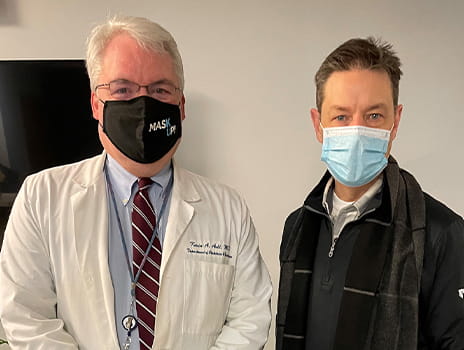May 18, 2022
It’s not every day you see your professor interviewed on national TV. Although some days it might as well be around here.
Physicians at The University of Kansas Health System, many of whom also teach at the University of Kansas Medical Center, are interviewed by the media all the time.
Dr. Kevin Ault hears it.
“Every once in a while, someone will say, ‘Oh, I saw you on CNN.’”
Those are his students, so imagine how much cache he brings into the classroom in the areas of obstetrics and gynecology, and while treating patients at our Main Campus in Kansas City as well as Overland Park.
Dr. Ault is 1 of 15 voting members on a committee studying infectious diseases for the Centers for Disease Control and Prevention (CDC). That means he’s been not only on the front lines of the COVID-19 pandemic, decisions that affect millions of Americans sit right in his lap. He’s brilliant, but he’ll tell you his role at the CDC came from proximity.
“Before 9/11, you could walk right across the street from Emory University to the CDC” in Atlanta, he remembers. Dr. Ault got his medical degree at Indiana University and had his first tour of duty at KU Medical School before spending years at Emory. He made many CDC connections during that time and eventually joined the Advisory Committee on Immunization Practices.
As an Ob/Gyn, he became an expert at how infectious diseases affect women and newborns, particularly the human papillomavirus and hepatitis B.
“One of the first things we did in the early ‘90s was to start vaccinating newborns, and that has turned out to provide decades of protection.”
He says working on those 2 infections and previous novel coronaviruses helped the committee in March 2020 at least make 2 plans: a plan before a vaccine could be developed and the other once vaccines started rolling out.
“There was just a tremendous amount of data to go over and synthesize and discuss. That was a skill I had before I got on the committee. The main thing is to keep up with the firehose of information that we get.”
He says the committee and the CDC as a whole quickly learned COVID-19 was a different animal than infections they had previously worked. But to the extent that it would become a worldwide pandemic, well …
It has been scary. But, on the other hand, it’s history repeating itself. The question you look at from the last 2 years is ‘Did we put things together efficiently?’ At some point in the next year or 2, ‘What did we do right and what did we do wrong?’ – Kevin Ault, MD
OB/GYN
When COVID-19 stopped the world
Like you, Dr. Ault remembers what it felt like when the world stopped. His wife, for instance, attended the first night of the Big 12 Basketball Championship. That was a Wednesday. The next day, organizers stopped the tournament. Right after, the NCAA announced March Madness would be scrapped. Major League Baseball players waited in limbo in Arizona and Florida for a few days. Then they just went home.
Dr. Ault remembers the TV on in the background during the Big East conference champion featuring Creighton vs. St. John. Some of his colleagues went to Creighton. The NCAA stopped the game at HALFTIME.
All because it was becoming clear that COVID’s transmission from person to person met the qualifications for a nightmare scenario.
“Yeah, if you go back and listen to what Dr. (Anthony) Fauci was saying in January and February vs. what he says the next 2 years, the switch was that we realized there was asymptomatic spread.”
At one point, with 15,000 scientists at the CDC dropping their specialties to concentrate on COVID-19, he figures there were 30,000, maybe 40,000, people listening in on the Zoom calls Dr. Ault attended regularly. He was 1 of a 100 “on the line” to voice opinions, ask questions and eventually vote. Plus, with his reputation as a clinician, teacher and data collector, the CDC really needed him. He had to weigh in on one of the more controversial topics: the vaccine and pregnant women.
Because pregnant women are considered a protected class, they were not required to get the vaccine. But Dr. Ault encouraged expectant moms to be vaccinated. He was convinced of the vaccine’s safety and effectiveness.
“It has been scary. But, on the other hand, it’s history repeating itself,” he said. “You can go to the National WWI Museum and see how the 1918 pandemic affected the way the war was fought in Europe. So, I think we have plenty of background on the flu pandemics of the 20th and 21st centuries and from the outbreaks of other coronaviruses we’ve seen.
“The question you look at from the last 2 years is ‘Did we put things together efficiently?’ At some point in the next year or 2, ‘What did we do right and what did we do wrong?’ And we all agree that we could have done a better job at pregnancy and influenza, and we probably will have to rehash that.”
Dr. Ault often encourages his students to read “And the Band Played On,” the book and movie about the early days of the AIDS pandemic.
“You can go back and read that book and see that some of the mistakes that were happening then are happening now. The point I usually try to make to the med students and the younger doctors is that somebody’s got to write all of this down and remember this because it’s still going to be relevant a couple of years later.”
Maybe after he’s retired and a CDC emeritus, he’ll write the book. His former students will probably see him on TV promoting it.
Interested in hearing Toby's latest take? Subscribe to follow along.





